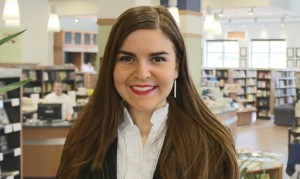By Samantha Ruggiero CLAS ’14, originally published May 19, 2014 in CLAS News.

If there’s one word that translates UConn senior Krisela Karaja’s story into words anyone can understand – it would probably be “translation.”
Literary translation, says Karaja, is a challenging endeavor because the translator carries the responsibility of not only delivering an author’s message, but also interpreting the cultural background of a word or phrase.
“I like the process of translating poetry because there are so many ways to tackle it,” says Karaja. “There’s no such thing as a literal translation because an expression in Albanian might not have the same cultural baggage if it were just translated word-for-word in English.”
Karaja, a double major in English and Spanish, has spent much of her undergraduate career bridging the gap between language and literature by composing English translations of poems and academic essays originally in written Albanian or Spanish. Born in Albania, Karaja moved to the United States when she was two years old and is a native Albanian speaker. She is also fluent in Spanish.
“My interest in language and literature stems from a natural desire to integrate my knowledge of the Spanish, English and Albanian languages,” says Karaja. “I’ll be reading a really great text in Albanian that isn’t very well-known in English, and think, ‘Wouldn’t it be great if I could translate and share this?’”
Throughout her undergraduate years at UConn, Karaja has explored her cultural roots by working as the Poetry and Translations Editor for the Long River Review, UConn’s student-run literary magazine, as well as through her various leadership roles in the Albanian Student Association.
“Coming to UConn has really helped me to tap into that identity,” says Karaja. “I was able to merge the social aspect of my culture, through the Albanian Student Association, with my academic work in translation.”
Karaja’s interest in languages and literature has also extended to her honors research project on post-memory in English, Albanian and Spanish post-modern literature. One example of literary post-memory that Karaja is including in her thesis is Maus, a graphic novel that depicts the author, Pulitzer Prize winner Art Spiegelman, interviewing his father about his experiences during the Holocaust. Karaja’s thesis earned her a Summer Undergraduate Research Fund (SURF) grant to travel to Albania this past summer, and also resulted in her selection as a Fulbright Research Fellowship finalist.
“Post-memory is memory that is removed from personal experience or by a generational distance,” says Karaja. “But you still hear so many stories about it [the original memory of a usually traumatic cultural circumstance] that you’re still affected by it a generation later.”
If selected as a Fulbright Scholar, Karaja will return to Albania in fall 2014 to study the Albanian literary landscape.
“It’s a topic that resonates so deeply with me,” says Karaja.
Karaja has worked closely with Assistant Professor-in-Residence Darcie Dennigan of the Department of English, with whom she has taken four classes and Dennigan guided Karaja on the translation of six poems by Albanian poet Luljeta Lleshanaku. This March the Susquehanna Review, an undergraduate international literary magazine, published two of the translations.
“Translations require a confidence in your abilities to manage a bunch of different elements all at once,” says Karaja. “To be selected is such an honor.”
Dennigan is excited to see that the Susquehanna Review is recognizing Karaja’s hard work.
“I am always impressed by Krisela’s scholarly work ethic,” says Dennigan. “She also really appreciates translation as an art form.”
As the current Editor-in-Chief of the Long River Review, Karaja has also collaborated with Dennigan throughout the entire publication process. Dennigan says that Krisela has been busy all year building a foundation for future editors of the Long River Review.
“At the beginning of the year she came in with a long list of ideas and big goals,” says Dennigan. “She’s so happy to be doing the job and she she’s always looking ahead.”
Working as Editor-in-Chief at the Long River Review has also taught her the humility of being selected or rejected from literary magazines.
“It’s not always matter of if your work is ‘good’ or ‘bad’,” says Karaja. “Sometimes it’s just all of the stars aligning in terms of what kind of work the staff is looking for and what kind of room they have to work with.”
Karaja is considering obtaining her teaching certificate and teaching at a school, or working in publishing before going to graduate school. She’s also using her editorial skills to develop a blog and possibly an online literary journal. Ultimately, she would like to earn her Ph.D in English and teach at a university.
“I’m just as excited for Fulbright as I am for all of these possibilities,” says Karaja. “I would really like the opportunity to try something new and different.”